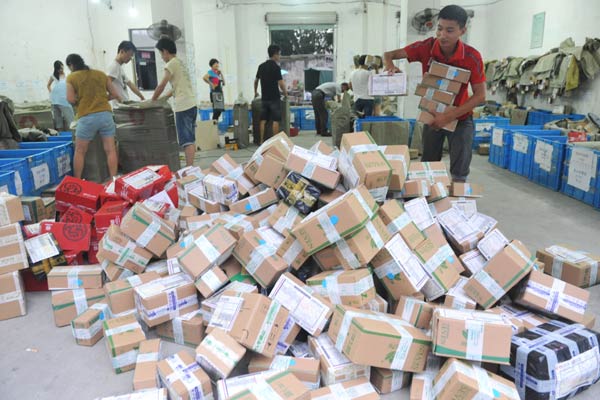


Workers at a delivery service sort parcels in Hangzhou, Zhejiang province. [File photo by Hu Jianhuan/China Daily]
BEIJING, March 27 -- China will change the tax rules on online retail goods from April 8 to level the playing field for e-commerce platforms and traditional retailers and importers.
Retail goods purchased online will no longer be classified as "parcels," which enjoy a "parcel tax" rate, lower than that on other imported goods. Instead, online purchases from overseas will be charged in the same way as any other imported goods, the Ministry of Finance (MOF) announced on Thursday.
"Parcel tax is not for trade purposes, which is exactly what online retailing is. It is unfair to conventional importers and domestic producers," said Zhang Bin of the Chinese Academy of Social Sciences.
China levies parcel tax on imported goods worth less than 1,000 yuan ($150), and the rates is mostly 10 percent. Taxes under 50 yuan are waived. As demand for overseas goods grows, online purchasing agents have taken advantage of parcel tax and used new methods such as repackaging and mailing products separately to avoid tax.
The new policy only allows a maximum of 2,000 yuan per single cross-border transaction and a maximum of 20,000 yuan per person per year. Goods that exceed these limits will be levied the full tax for general trade, the MOF said.
According to a 2015 survey by Amazon China on online imports, most buyers are under 35 and around 90 percent have a college education. More than half earn more than 5,000 yuan per month.
The new policy will speed up customs clearance so consumers will receive most orders from overseas within two weeks, instead of the current two months.
Cross-border e-commerce has been booming in China. The country plans to set up more cross-border e-commerce pilot zones to attract businesses, create jobs and nurture new business models that will boost foreign trade and stimulate the economy, the State Council announced in January.
The expansion of the pilot zones came at a time when the country is facing sluggish foreign trade. Total export and import value for 2015 decreased 7 percent year on year, falling for the first time in six years.
The Ministry of Commerce predicted the volume of cross-border e-commerce in 2016 will reach 6.5 trillion yuan and will soon account for 20 percent of China's foreign trade.
 Train rides through blossoms
Train rides through blossoms HD pictures of battleships of PLA Navy
HD pictures of battleships of PLA Navy East Sea Fleet conducts combat drills
East Sea Fleet conducts combat drills Sophie Marceau goes square dancing in Guangzhou
Sophie Marceau goes square dancing in Guangzhou Police officers learn Wing Chun in E. China
Police officers learn Wing Chun in E. China Charming models compete in super model contest in Beijing
Charming models compete in super model contest in Beijing Thai most beautiful transgender Nong Poy release new photos
Thai most beautiful transgender Nong Poy release new photos Now and then photos of Shanghai Jiaotong University
Now and then photos of Shanghai Jiaotong University Is this what air travel will look like in 2050?
Is this what air travel will look like in 2050? Top 20 hottest women in the world in 2014
Top 20 hottest women in the world in 2014 Top 10 hardest languages to learn
Top 10 hardest languages to learn 10 Chinese female stars with most beautiful faces
10 Chinese female stars with most beautiful faces China’s Top 10 Unique Bridges, Highways and Roads
China’s Top 10 Unique Bridges, Highways and Roads Two Czechs describe how their love of China has lasted decades
Two Czechs describe how their love of China has lasted decades  Su Bin deserves respect whether guilty or innocent
Su Bin deserves respect whether guilty or innocent  US and China cooperate on largest nuclear security center in Asia-Pacific
US and China cooperate on largest nuclear security center in Asia-Pacific  Longer hours, differences in office culture and time zones trigger burnout among foreigners working in China
Longer hours, differences in office culture and time zones trigger burnout among foreigners working in China Day|Week